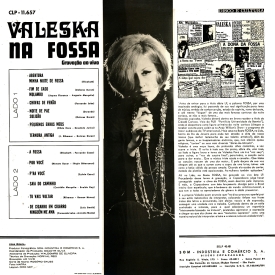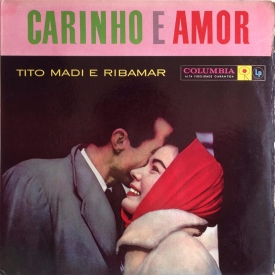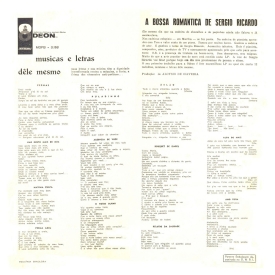
Ternura Antiga was introduced in late 1960 by Lucienne Franco at the Festival das Dez Mais Lindas Canções de Amor, issued on record as Festival do Rio – As Dez Mais Lindas Canções de Amor..
At the end of 1959, after Dolores Duran had died at the age of only 29, her friend Marisa Gata Mansa gave the composer and pianist Ribamar an unfinished poem by Duran with the request to compose a song in memory of her. The resulting Ternura Antiga was introduced with the emotive recording of Luciene Habib Franco Freitas Câmara, who was little known at the time.
The Festival das Dez Mais Lindas Canções de Amor, sponsored by the Copacabana record label and hosted by TV Rio, was one of the first singing and composing competitions that would gain enormous popularity in the following years. The final took place on 10 November 1960 at the Tijuca Tênis Clube in Rio de Janeiro and presented the ten songs that had qualified among the more than 1000 contest entries, performed by Miltinho, Jorge Goulart, Zezé Gonzaga, Roberto Silva, Ernani Filho, Carlos José, Agnaldo Rayol, Lenita Bruno. Lucienne Franco and Ted Moreno.

Ternura Antiga was critically acclaimed, although the song came second, losing out to Canção em Tom Maior, written by Ary Barroso and sung by Ted Moreno. Interestingly, despite this success, Lucienne Franco’s original was only released in March 1961 as a B-side to Poema do Adeus – her version of Miltinho’s competition entry. This may be the reason why Tito Madi’s recording became the most successful version of Ternura Antiga and one of the big hits of 1961.
José Pacheco Lins aka Pachequinho’s sensitive arrangement of the original was reused on both his own recording of Ternura Antiga and Lucienne Franco’s re-recording with French lyrics titled Anciene Tendresse.
Among the finest interpretations are undoubtedly those of Elza Laranjeira, Tito Madi, Nelson Gonçalves and Altemar Dutra, and among the instrumental versions, that of Araken Peixoto with his muted trumpet. Ribamar himself did not record Ternura Antiga until 1969, when he dedicated an entire album to the songs of Dolores Duran.
My sincere thanks to the Jornal RelevO for publishing this article in their column RelevO presents Brazilliance: The song of the month for the sophisticated connoisseur!
Selected recordings of Ternura Antiga:
1. Lucienne Franco from the album Festival do Rio – As Dez Mais Lindas Canções de Amor (1960, Copacabana CLP 11172) and the single Poema do Adeus b/w Ternura Antiga (1961, Copacabana 6.226)


2. Pachequinho from the album Música do Coração (1961, Copacabana CLP 11202)


Art work for Música do Coração by Sérgio Malta
3. Tito Madi from the album Romance (1961, Columbia LPCB 37197)


4. Elza Laranjeira from the album Elza Laranjeira Canta Sucessos (1961, RGE XRLP 5133)


5. Severino Araújo from the album Dance o Chá Chá Chá (1961, Continental LPP 3191)


6. Araken Peixoto from the album Araken Ontem e Hoje (1961, Discos Drink LP-DF-13.012)


7. Banda do Corpo de Bombeiros da Guanabara from the album Estão Voltando as Flores (1962, Odeon MOFB 3283)


8. Marisa Gata Mansa from the album Little Club Apresenta Marisa (1962, Copacabana CLP 11257)


Artwork for Little Club Apresenta Marisa by Sérgio Malta with photograph by Ronaldo Goyanes
9. Francisco José from the album Francisco José e os Sucessos de Ouro da Música Romântica Brasileira (1962, Philips P 632.100 L)

10. Lucienne Franco from the album Pelos Caminhos do Mundo (1963, Copacabana CLP 11309)


11. Nelson Gonçalves from the album Na voz de Nelson Gonçalves (1963, RCA Victor BBL 1231)


12. Altemar Dutra from the EP Mensagem de Altemar Dutra (1968, Odeon DP-404) and the album O Romântico (1970, Odeon MOFB 3624)


13. Ribamar from the album Ribamar Interpreta Dolores Duran (1969, RCA Camden CALB 5231)


14. Waleska from the album Waleska na Fossa (1971, Copacabana CLP 11657)


Art work for Waleska na Fossa by Ciro Ney with photograph by Mafra
15. Áurea Martins from the album O Amor em Paz (1972, RCA Camden 107.0129)

Selected medleys including Ternura Antiga:
1. Sandoval Dias from the album Sandoval Dias e Seu Sax Dançante (1962, Philips P 632.109 L)


Art work for Sandoval Dias e Seu Sax Dançante by Paulo Brèves with photograph by Mafra
2. Gerson King Combo, Amaro & Os Diagonais from the album Brazilian Soul (1970, Polydor LPNG 44.057)


Art work for Brazilian Soul by Nilo Jorge with photograph by Gil Prates
3. Quarteto em Cy from the album Antologia so Samba Canção (1975, Philips 6349 133)



TERNURA ANTIGA
Ai, a rua escura, o vento frio • Esta saudade, este vazio • Esta vontade de chorar
Ai, tua distância tão amiga • Esta ternura tão antiga • E o desencanto de esperar
Sim, eu não te amo porque quero • Ai, se eu pudesse esqueceria • Vivo, e vivo só porque te espero • Ai, esta amargura, esta agonia


























































































































































